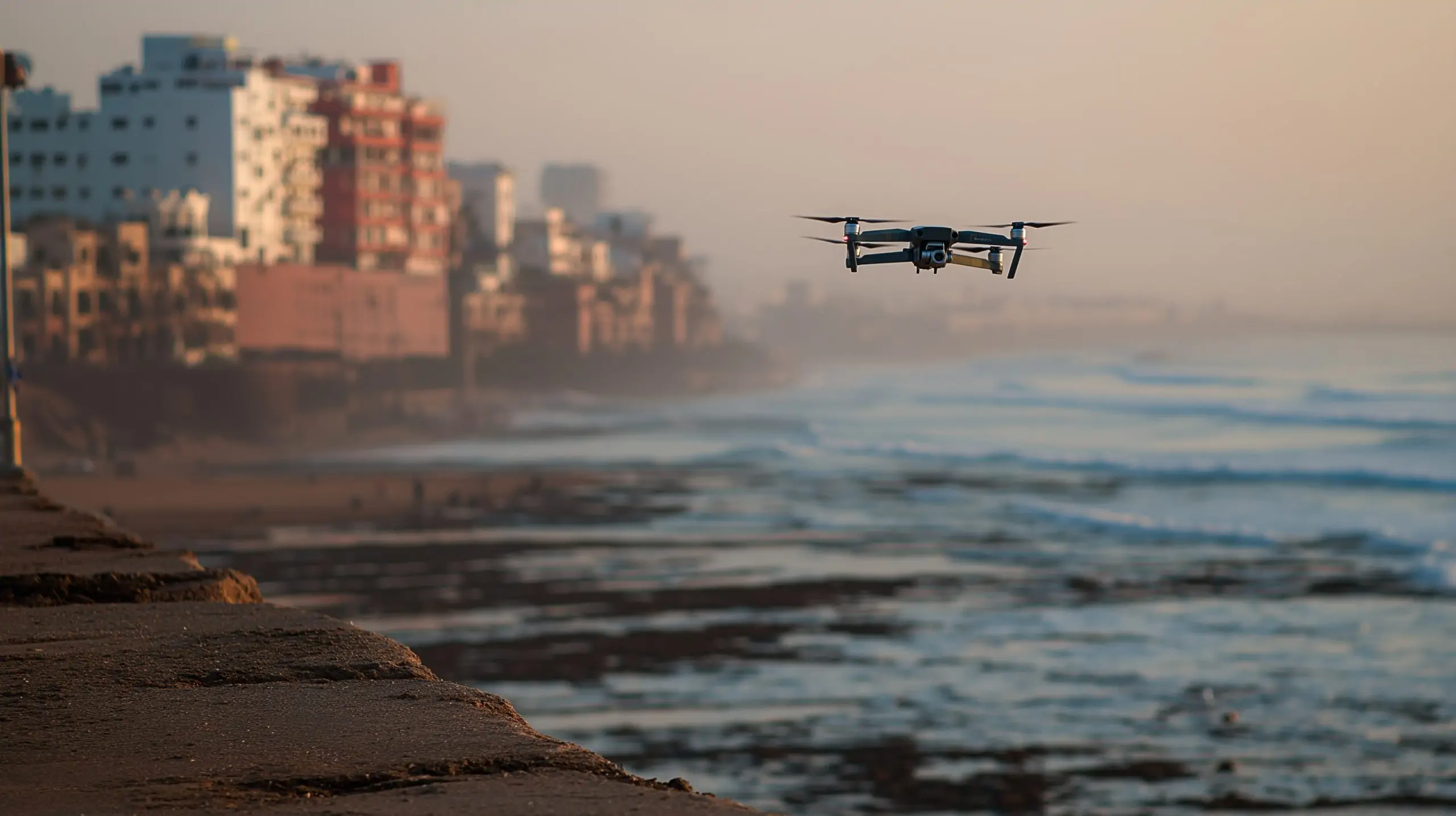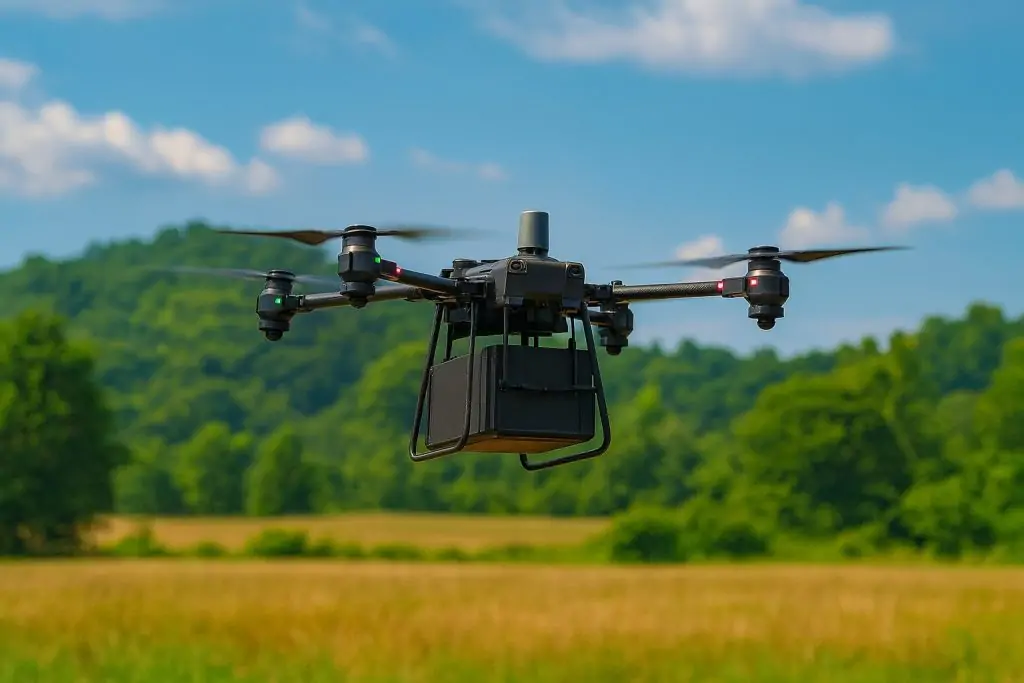Key Facts
- Nationwide Ban: Morocco has effectively banned drones for the general public since 2015, citing security and privacy concerns en.bladi.net drone-traveller.com. Importing or using a drone without prior authorization is illegal in Casablanca and across Morocco.
- Strict Import Controls:Bringing a drone into Morocco requires a special license. If you enter with a drone undeclared, it will be confiscated by customs (with no guarantee of return) uavsystemsinternational.com en.bladi.net. Declared drones are held by authorities until you depart.
- Harsh Penalties: Unauthorized drone use can lead to arrest, fines, and confiscation. Travelers caught with drones face a fine of 1,165 Moroccan Dirhams (~€110) and seizure of the device drone-traveller.com canifly.in. In one case, a tourist was arrested for flying a drone during vacation, underscoring the strict enforcement en.bladi.net en.bladi.net.
- Recreational Use Prohibited:Hobbyist drone flying is essentially forbidden. Individuals may not fly drones for fun in Casablanca or elsewhere in Morocco under current law canifly.in drone-traveller.com. Only licensed companies and authorities can operate drones, and even then under tight oversight.
- Commercial Flights by Permit Only:Commercial operators (e.g. film crews, surveyors) can use drones only with special permits and detailed approvals. Each flight must be pre-authorized with exact coordinates and often tied to a film permit morocco-phototours.com ozzfilms.com. Permits take time and require local sponsors, making spontaneous drone projects impossible.
- No-Fly Zones in Casablanca:Casablanca is riddled with no-fly zones, including airports, ports, military bases, royal residences, and government buildings morocco-phototours.com ozzfilms.com. Drones cannot operate near Mohammed V International Airport or other sensitive sites. Dense urban areas and large crowds are also off-limits for drone flights uavsystemsinternational.com.
- Enforcement & Monitoring: Moroccan authorities remain highly vigilant. Airports X-ray luggage for drones, and police closely monitor for any unauthorized drone activity. The Directorate of Civil Aviation explicitly requires advance permission for any drone flight, with violators risking equipment confiscation and legal action gov.uk.
- Government Drone Use Expanding: While civilian use is banned, the Moroccan government and military actively use drones for security and public safety. During the COVID-19 pandemic, authorities deployed drones for aerial surveillance, public announcements, and sanitization morocco-phototours.com. Morocco is considered a leader in Africa for professional unmanned aviation, even as civilian drone usage remains tightly controlled morocco-phototours.com.
Legal Framework for Drone Use in Morocco
Morocco’s drone laws are anchored in a strict legal framework that effectively prohibits civilian drone operations. In February 2015, a joint decree (Decree No. 386-15) by the Ministry of Interior and Ministry of Foreign Trade imposed a ban on importing drones and other remotely-controlled flying devices without prior government approval en.bladi.net moroccoworldnews.com. This decree was a response to growing security concerns – regulators deemed unregulated drones a potential threat for terrorism, espionage, and privacy invasion. The law subjects both the import and use of drones to a prior authorization process to safeguard sensitive sites and national security moroccoworldnews.com.
Under this framework, any unmanned aerial vehicle (UAV) – regardless of size – is considered illegal to bring into Moroccan territory or operate, unless explicit permission is obtained in advance. Drones brought in illegally are seized by customs on entry moroccoworldnews.com. The authorities have made it clear that only certain entities (not private hobbyists) can even apply for authorization to use drones en.bladi.net. In practice, this has created a near-total ban on recreational drones and a tightly regulated regime for commercial use.
Notably, Morocco’s approach is national – the same laws apply in Casablanca as in the rest of the country. There is no separate city ordinance for Casablanca; instead, national law governs drone usage uniformly. The Directorate General of Civil Aviation (DGCA) oversees drone permissions on a case-by-case basis uavsystemsinternational.com. The Moroccan Foreign Trade Law (Law 13/89) also underpins these restrictions by requiring import licenses for any drone, in coordination with security authorities ledroniste.ma. In summary, the legal framework in Morocco can be characterized by an overarching principle: drones are banned unless you have explicit government authorization, which is exceedingly difficult to obtain for private individuals.
Hobbyist and Recreational Drone Users
For hobbyist drone enthusiasts, Morocco (including Casablanca) is one of the most restrictive environments in the world. Recreational use of drones is completely prohibited under current regulations drone-traveller.com. Unlike many countries that allow drones under certain weight limits or in certain areas, Morocco’s blanket ban means that tourists and locals cannot legally fly a drone for fun anywhere in the country. The ban covers all recreational flying – whether it’s capturing aerial photos of Casablanca’s Hassan II Mosque or filming a surfing session on the coast, no personal drone flights are allowed without prior approval, which hobbyists generally cannot get.
In practical terms, a hobbyist who brings a drone to Casablanca will face immediate barriers. Customs officers at airports are on the lookout for drones, and signage at entry points warns travelers to declare any UAVs reddit.com. If a hobbyist declares a drone, customs will hold it in storage until the person leaves Morocco uavsystemsinternational.com. If they fail to declare it and it’s found (through baggage x-ray or other means), the drone will be confiscated and not returned, and the individual could be fined and even detained uavsystemsinternational.com en.bladi.net. This applies even to small toy drones. As one travel site bluntly states: “private use is completely prohibited” in Morocco drone-traveller.com.
The rationale for this tough stance is rooted in security and privacy. Authorities fear that even a hobbyist’s camera drone could inadvertently spy on sensitive sites or invade privacy in densely populated areas morocco-phototours.com morocco-phototours.com. There have been reports that a reckless hobby flight in the past – such as a drone flown over a royal palace – contributed to the clampdown morocco-phototours.com. Whether or not that specific story is apocryphal, it reflects officials’ sensitivity to drones. Unlike in countries where one can fly in a park or open area under basic rules, in Morocco there are no such allowances for recreational pilots.
Hobbyists in Casablanca thus have essentially no legal pathway to fly. There are no public drone clubs or open RC airfields for amateurs, since any drone use requires the same high-level permissions as commercial flights. The Moroccan Ministry of Interior has made it clear that drones are not to be treated as toys in public airspace. Even small drones under 250g (which many countries exempt from strict rules) fall under the ban if equipped with a camera or capable of flight outdoors. In summary, if you are a drone hobbyist, Morocco is off-limits for flying – the best advice is to leave your drone at home when visiting Casablanca en.bladi.net.
Commercial Drone Operations in Morocco
Commercial drone operations – such as aerial filming, surveying, agriculture, or industrial inspections – are possible in Morocco, but under very tight regulations and an onerous permit process. The law does not outright ban commercial use, but it requires companies to obtain special permission on a case-by-case basis moroccoworldnews.com. In practice, only registered businesses or organizations can navigate the permitting system, and each drone activity must be explicitly authorized by authorities.
For example, film production companies often seek to use drones for movie shoots in Morocco’s scenic locations. To do so, they must go through a multi-step process:
- First, the company needs a general filming permit from the Moroccan Cinematographic Center (CCM) for the project morocco-phototours.com. Without a film permit, a drone permit won’t even be considered.
- Next, they must apply for a drone flight permit from provincial authorities (the Wilaya) for each specific flight or location. The application must include precise GPS coordinates of the flight area, the date and time of the flight, and details of the drone model morocco-phototours.com ozzfilms.com. Authorities will conduct a security evaluation of the request.
- A local Moroccan drone license holder or operator often must be involved. Foreign commercial pilots are generally required to work with a locally licensed partner who can co-sponsor the permit and be present during operations morocco-phototours.com ozzfilms.com. This local authorization is a key requirement for approval.
- Lead times are significant. Obtaining approval can take 10–14 days or more for each flight, and even then, approval is not guaranteed morocco-phototours.com ozzfilms.com. For any specialized drone equipment that needs to be brought into the country, an additional importation permit (taking ~40 days) is required after the film permit is in hand morocco-phototours.com ozzfilms.com.
Once a permit is granted, the authorities attach strict conditions. Flights can only occur at the approved times and locations, and often under police supervision if near sensitive sites ozzfilms.com ozzfilms.com. The permit will list any extra restrictions (e.g., altitude limits, no flying over people, etc.) relevant to that flight. Popular commercial drone uses such as real estate photography, agricultural monitoring, or mapping are theoretically allowed but only if the operator goes through similar hoops for authorization each time.
Morocco does allow some local enterprise use of drones: Moroccan companies have been using drones in specific sectors for years, positioning the country as one of Africa’s more advanced in drone tech morocco-phototours.com. Applications like filming, precision agriculture, solar farm monitoring, and infrastructure mapping have seen legal drone use, but always under the umbrella of special permission and oversight morocco-phototours.com. This controlled openness means that if you are a commercial entity with a legitimate need, you must partner with the authorities and often local experts to get permission, rather than simply flying under general rules.
Importantly, insurance and pilot qualifications play a role in commercial operations. While Morocco doesn’t mandate a formal drone pilot license for permits, it “highly recommends” having an internationally recognized certification (such as an FAA Part 107 or EASA license) to demonstrate competence morocco-phototours.com. All commercial operators are required to carry liability insurance covering the specific drone in use morocco-phototours.com. These conditions ensure that any drone flight is done by experienced, insured professionals, minimizing risks.
In summary, commercial drone use in Casablanca and Morocco is heavily regulated but feasible if one navigates the bureaucracy. Businesses must plan far in advance, budget for permit fees and possibly security escorts, and be prepared for potential denials or last-minute revocations (permits can be canceled on short notice for security reasons) ozzfilms.com. The process, while burdensome, reflects the Moroccan government’s cautious approach: drones can contribute to the economy and projects (like films or surveys), but only under strict government control and oversight.
Government and Military Drone Use
The Moroccan government and military operate under a different set of rules when it comes to drones. The restrictions that bind civilians do not preclude authorities from leveraging drone technology for security and public service. In fact, Morocco has been rapidly expanding official drone usage in recent years, even as it keeps the ban in place for the general public morocco-phototours.com.
For instance, during the COVID-19 pandemic, Moroccan authorities in cities like Casablanca and Rabat deployed drones for various purposes: aerial surveillance of public areas, broadcasting public service messages via loudspeaker, and even spraying disinfectant in some neighborhoods morocco-phototours.com. These efforts were widely reported and showcased how drones could aid in crisis response. The success of such uses demonstrated that Morocco’s concern is not with drones per se, but with who controls them – the government is far more comfortable when drones are in its own hands.
Morocco’s security forces have also integrated drones for border control and anti-crime operations. The country faces challenges with smuggling (particularly along the northern coast towards Spain) and has looked to drones as a tool to monitor and patrol remote areas. In late 2024, for example, Moroccan police and customs were reported to add dozens of drones to help patrol borders and combat drug trafficking networks moroccoworldnews.com. The Royal Moroccan Armed Forces have similarly invested in larger military-grade drones. Morocco has acquired surveillance and combat drones (such as Turkish and Israeli-made systems) to strengthen its defense capabilities, especially given regional tensions. These military drones are operated exclusively by the armed forces and are not subject to the civilian authorization process.
Legally, the 2015 drone ban exempted “companies or government institutions” that obtain prior permission moroccoworldnews.com. This means government agencies can authorize themselves (through internal procedures) to use drones for approved projects. Law enforcement and emergency services can deploy drones for public safety, search and rescue, crowd monitoring, and surveillance as needed, with the understanding that these uses serve national security or public interest. For example, drones have been used to survey disaster areas and to assist firefighting efforts, all under official auspices.
Morocco prides itself on being among the most advanced African countries in unmanned aviation for public use morocco-phototours.com. There is a dedicated industrial base and training for qualified drone pilots in the country – but these pilots are typically working with or for the government or licensed companies morocco-phototours.com. The existence of this professional drone ecosystem stands in stark contrast to the ban on consumer drones. Essentially, Morocco has embraced drones as a state tool while barring them as a private gadget.
In Casablanca, residents may occasionally see drones in the sky, but these will be operated by the police, military, or government-authorized crews. A common sight during the pandemic was drones hovering over neighborhoods broadcasting warnings or checking for lockdown compliance – all coordinated by authorities. Such use is fully legal for the government and reflects an important dynamic of Moroccan drone law: drones are not “banned” for everyone, just tightly controlled to remain in authorized hands.
International Visitors Bringing Drones into Casablanca
Foreign visitors and tourists face particularly strict rules regarding drones in Morocco. If you are traveling to Casablanca (or any Moroccan city) from abroad, bringing a drone is strongly discouraged by both Moroccan authorities and foreign embassies. Morocco’s customs enforcement is very clear on this point: any drone entering the country must be declared and have prior authorization – otherwise, it will be confiscated at the border uavsystemsinternational.com en.bladi.net.
Upon arrival at Casablanca’s Mohammed V Airport, travelers will notice signs about drones. Customs officers are trained to identify drone equipment on the X-ray scanners. If you declare a drone, the standard procedure is that customs will tag and store the device securely (often in a bonded warehouse at the airport). You will receive a receipt, and you can retrieve your drone only when departing the country uavsystemsinternational.com. Essentially, the drone stays in airport lockup during your stay in Morocco – you are not allowed to use it. Some airports even charge a storage fee for holding the drone until pick-up drone-made.com, given potentially long holding times.
If a visitor tries to sneak a drone in without declaring and it’s discovered – either at entry or later – the consequences escalate. The drone will be permanently seized and not returned to the traveler uavsystemsinternational.com. Furthermore, the person becomes liable for legal penalties. Moroccan law provides for fines and even arrest/prosecution for illegal import or use of a drone en.bladi.net. There have been real incidents illustrating this: in one 2023 case, a French tourist vacationing in Morocco flew a drone to capture landscape footage; when he went to fly out of Ouarzazate, airport security discovered the drone in his baggage and he was arrested on the spot en.bladi.net en.bladi.net. He endured police detention and nearly faced charges, only avoiding severe punishment after lengthy proceedings and intervention en.bladi.net en.bladi.net. Such stories serve as warnings that Morocco does not take unauthorized drone use lightly, even for foreigners.
Importantly, getting a license as a foreigner to bring a drone is almost unfeasible unless you have a specific professional reason. The Moroccan authorities state that “only companies and public authorities can submit applications” for drone import licenses en.bladi.net. A tourist wanting to fly for personal use would not qualify. In rare cases, a foreign production company might arrange a permit in advance for a specialized drone (for example, if coming for a film shoot), but this involves working with a Moroccan sponsor and starting paperwork months ahead morocco-phototours.com. The typical traveler will not be granted an exception.
Embassies and travel advisories echo this stance. The UK government travel advice explicitly notes that you must have permission from the Moroccan DGCA to fly a drone, or you risk fines and confiscation gov.uk. The French foreign ministry likewise warns that bringing a drone can lead to it being seized by customs and that using one without authorization can result in legal proceedings en.bladi.net.
For international visitors, the bottom line is: do not plan on flying a drone in Morocco. If you bring one, expect it to be taken at the airport. Many seasoned travelers share the “leave it at home” advice to avoid ruining your trip en.bladi.net. Even transiting through Casablanca with a drone can be tricky – there are anecdotes of people booking an airport hotel just to store their drone during a layover to avoid entering customs with it mavicpilots.com. If your journey includes Morocco and another country where you intend to use a drone, make sure Morocco is your last stop (so you can pick up the drone on exit) or make separate arrangements. The strict approach to visitor-carried drones underscores Morocco’s commitment to control its airspace even at the cost of inconveniencing tourists.
Registration, Permits, and Licensing Requirements
Given the prohibitive stance, any drone that is allowed to fly in Morocco must go through a maze of registrations and permits. The process involves multiple authorities and steps:
- Import License: First and foremost, if a drone is to be brought into Morocco (either permanently or temporarily), an importation license is required. This is obtained from the Ministry of Foreign Trade in line with Law 13/89 on foreign trade ledroniste.ma. The application for import is closely coordinated with the Ministry of Interior for security vetting. Without this license, customs will not release the drone to enter the country moroccoworldnews.com. In practice, import licenses are granted only for specific professional uses and often to Moroccan companies or government agencies. Temporary import for a film project, for example, needs this license plus a local partner’s involvement morocco-phototours.com.
- Drone Registration: Any drone authorized for use likely needs to be registered with Moroccan authorities (the exact mechanism is handled by DGCA or related bodies). Details such as the drone’s make, model, serial number, and owner/operator information would be logged. This is to ensure traceability. While information on a public “drone registry” is limited, the requirement for declaring each use with authorities effectively registers the drone per project. Some sources indicate that registration is indeed mandatory for permitted drones drone-traveller.com, and a tag or identification number might be issued to mark approved UAVs.
- Operator Licensing: Morocco does not issue a specific drone pilot license domestically (there is no local equivalent of a Part 107 certificate). However, demonstrating pilot competence is crucial for obtaining permits. Authorities typically expect that the pilot (especially if foreign) holds a recognized international drone certification morocco-phototours.com. For Moroccan operators, having training or certification from abroad or from the manufacturer (like DJI training) can bolster an application. In all cases, the named pilot must be approved as part of the permit. If a foreign pilot is flying, that person must be identified in the request, and often a Moroccan co-pilot or supervisor is assigned to liaise with authorities ozzfilms.com. Essentially, while there’s no exam process in Morocco for drone pilots, authorities hand-pick who is allowed to fly through the permitting system, favoring experienced and vetted individuals.
- Flight Permits (Local Authorization): For each flight or project, a flight permit from local authorities (usually the Wilaya or provincial governor’s office) is mandatory ozzfilms.com. This is typically in conjunction with other permits (like a film permit if filming). The application must include when, where, and why the drone will fly. Authorities will check if the location is sensitive and coordinate with police or military if needed. Only after receiving a written authorization can the flight proceed. The permit document will outline conditions (e.g., maximum altitude 120 meters, time window for flight, etc.). Moroccan law also generally limits drones to daylight operations in good weather and forbids flying over uninvolved people, though these are standard conditions listed in any authorization uavsystemsinternational.com.
- Insurance: Morocco requires drone operators to carry insurance for any approved flight morocco-phototours.com. Before a permit is granted, you may need to show proof of liability insurance covering damage or injury that could be caused by the drone. The insurance should correspond to the specific drone model and its use. This requirement ensures that in the rare event a drone is authorized, any mishap is financially covered. It aligns with international best practices and adds another layer of responsibility on the operator.
- Permits for Special Activities: If the drone use is part of a larger regulated activity (like filming, scientific research, or agricultural spraying), those overarching permits must be obtained too. For example, to film in Casablanca with a drone, one needs a filming permit from the Moroccan Film Commission (CCM) before the drone permit is issued morocco-phototours.com. For research, a permit from the relevant ministry might be needed in addition to the drone clearance. Morocco’s bureaucracy ensures every angle is covered.
- Timeline and Planning: The entire process demands substantial lead time. A straightforward drone permit can take a minimum of 10 days for approval under ideal conditions morocco-phototours.com. More often, authorities recommend applying several weeks in advance, especially if multiple locations or cities are involved (each province’s approval may be required). As noted earlier, if importing equipment, add 40+ days for that permit morocco-phototours.com. There is no “on the spot” or quick permit – even news media or emergency use by private entities would have to go through channels unless the government itself initiates an exception.
- Compliance and Oversight: Once permits are in hand, operators must carry them during operations. It’s common for police in Casablanca to check paperwork if they spot a drone, even if you have a permit. All flights must adhere strictly to the approved plan – straying outside the approved zone or time can void the permit and lead to intervention. After the operation, sometimes authorities require a report or notification that the flight is completed without incident.
In essence, the requirements to operate a drone legally in Casablanca are extensive – by design, to deter casual use. Only well-prepared, usually professional operators can meet them. The process ensures that any drone in the sky is known to authorities, piloted by qualified persons, and insured against mishaps. For the vast majority of people, these hurdles mean drones remain grounded.
Restricted and No-Fly Zones in Casablanca
Even with a permit, large portions of Casablanca and its surroundings are off-limits for drone flights. Moroccan authorities have designated various no-fly zones for drones, focusing on areas critical to security, public safety, or privacy. In Casablanca, the key restricted zones include:
- Airports: Casablanca’s Mohammed V International Airport is a strict no-fly zone for drones, as are smaller airfields in the region. Flying within several kilometers of an airport or flight path is prohibited uavsystemsinternational.com without special arrangement. This is a standard aviation rule to prevent interference with manned aircraft. Given Mohammed V Airport is one of Africa’s busiest, the airspace around it is heavily monitored.
- Military Sites: Any military installations in or near Casablanca are sensitive areas. While Casablanca is not primarily a military city, it likely hosts some military facilities or barracks. Drone operations near military bases or security installations are banned or require direct military supervision morocco-phototours.com. Morocco’s concern over drones as potential espionage tools makes them particularly wary of civilian drones around military zones.
- Royal Palaces and Residences: The Moroccan Royal Family has palaces or royal residences in multiple cities. Casablanca is known to have a royal palace (often used for ceremonies and events). The airspace around royal palaces is strictly off-limits to drones morocco-phototours.com. This is both for security and privacy of the monarch. Unauthorized aerial filming of a royal property would be taken extremely seriously.
- Government Buildings and Embassies: As Morocco’s economic capital, Casablanca has various government offices (though the official capital is Rabat). Key administrative buildings, foreign consulates/embassies, or critical infrastructure (like the Bank of Morocco offices, courts, etc.) are treated as sensitive locations. Drones cannot fly over or near these buildings without permission morocco-phototours.com. The same goes for major corporate headquarters or strategic industrial sites – any place where a drone might pose a security risk.
- Port and Critical Infrastructure: Casablanca is home to one of the largest ports on the Atlantic. Ports are typically restricted areas due to security (anti-smuggling and anti-terrorism measures). The Port of Casablanca and its immediate vicinity are no-fly zones for recreational drones morocco-phototours.com. Similarly, power plants, telecommunications hubs, and other critical infrastructure in the area would be protected. For example, if Casablanca has large factories or a refinery (it historically had a refinery nearby), those could be designated no-fly areas.
- Densely Populated Urban Areas: While not an official “zone” per se, flying over the bustling city streets of Casablanca is generally not allowed unless specifically approved. Moroccan regulations (like many others) forbid flying over “people or large crowds” uavsystemsinternational.com. Casablanca’s downtown, markets, and tourist sites often have crowds, making spontaneous drone use both illegal and dangerous. In essence, the default is urban = no, unless a closed-set film shoot with authorities’ clearance.
- Cultural and Historical Sites: Morocco is protective of its cultural heritage. In Casablanca, landmarks like the Hassan II Mosque might be considered sensitive – not for security, but out of respect and to prevent disturbances. There isn’t a publicized specific ban on flying near the mosque, but any application to fly there would be scrutinized (and likely denied if during visiting hours or prayers). Generally, areas where people’s privacy could be intruded (e.g., residential neighborhoods) can be deemed off-limits if not explicitly cleared.
These restricted zones mean that even if a commercial operator has a permit, the permit will not be granted for these areas without special high-level approval. Many of the no-fly zones “coincide with key filming destinations in cities such as … Casablanca”, which poses challenges for filmmakers morocco-phototours.com. Production companies must work closely with officials to find alternative angles or secure controlled access if they need a drone shot in a city. Often, the presence of police or military officers during the drone flight is required in borderline cases.
For hobbyists (who shouldn’t be flying at all), these no-fly zones underline why a casual flight is likely to draw immediate attention. Casablanca’s combination of an international airport, a royal residence, vital economic infrastructure, and dense population leaves virtually no open safe space for flying. Perhaps the only theoretical place a drone might fly legally is an isolated area outside the city after rigorous permission – but around Casablanca, even outskirts may fall under controlled airspace because of approach paths to the airport and other factors.
In summary, Casablanca’s no-fly zones reflect Morocco’s prioritization of security. Airports, military sites, royal palaces, ports, and government areas are categorically protected morocco-phototours.com. Drone pilots with permission must plan routes carefully to avoid encroaching on these zones, and most of the city is effectively a patchwork of restricted airspace. This reinforces the message: only fly if you absolutely must and have clearance, and even then, mind the boundaries.
Enforcement Practices and Penalties for Violations
Morocco backs up its drone restrictions with strict enforcement and severe penalties for violators. The approach is zero-tolerance: authorities not only have the laws in place, but they actively police them, especially in entry points like airports and in sensitive urban areas like Casablanca.
Customs Enforcement: The first line of defense is at the border. Moroccan customs officials have been instructed since 2015 to screen incoming luggage for drones or drone parts. They use X-ray scanners and sometimes manual inspections. If a drone is spotted, the traveler is immediately pulled aside. As noted, the drone is either stored (if declared) or seized (if undeclared) uavsystemsinternational.com. Customs maintains storage depots where declared drones are kept, often issuing documentation that allows retrieval later (within a certain timeframe). Interestingly, reports suggest a maximum holding period of 45 days for a drone at customs drone-traveller.com – likely meaning if someone isn’t leaving Morocco within that time, the drone might be transferred or considered abandoned. This mechanism hints at how seriously they treat drones akin to controlled items.
Travelers who attempt to hide a drone and get caught face immediate consequences: fines on the spot and involvement of law enforcement. The common fine reported is 1,165 MAD (approximately $120 or €110) drone-traveller.com. This fine amount likely comes from a schedule of penalties under customs or aviation law. In addition to the fine, the drone is confiscated permanently. There are anecdotes of tourists trying to negotiate or pay higher fines to get their drone back, but typically the answer is no – the device is taken, and the fine is paid as a punishment drone-traveller.com (one traveler recounted seeing a whole shelf of confiscated drones of all sizes in a customs office, underscoring that many have tried and failed drone-traveller.com).
Police and On-Ground Enforcement: Within Morocco, if a drone is seen flying without authorization, police are quick to respond. The country’s security apparatus is quite sensitive to unusual activities, especially anything that could involve filming or flying over strategic areas. In a city like Casablanca, police would likely be alerted by residents or security personnel if a drone is hovering overhead. Police units have been known to track down operators on the ground and detain them. Given that virtually no private individuals have permission, any drone sighting is presumed illegal until proven otherwise.
Violators can face arrest and legal prosecution. Moroccan law treats unauthorized drone use as a serious offense – it’s not just a civil infraction, but can be a criminal matter (especially if there’s suspicion of malicious intent). The decree from 2015 provides for “the full penalty of law” which includes arrest, confiscation of the drone, and a fine en.bladi.net. The exact jail terms are not publicized, partly because many cases end with confiscation and fines if the intent was innocent tourism. However, the possibility of imprisonment exists, particularly if aggravating factors are present (for example, flying over a military site could be seen as espionage, leading to much more serious charges).
Notable Case Example: The June 2023 case of the French tourist illustrates enforcement in action. He flew a drone during his holiday (aware it was forbidden, his local guide even warned him) en.bladi.net. At the airport, customs found the drone in his bag and immediately raised an alarm en.bladi.net. He was detained, interrogated, and made to sign reports in a foreign language, and had his passport seized en.bladi.net. This was effectively an arrest scenario, treating him as someone who committed a security offense. Only after intervention and pointing to his tourist status was he released, but he still lost the drone and likely paid penalties en.bladi.net. This case, reported in media, was intended to send a message to other travelers about how seriously Morocco enforces the ban.
Use of Technology: Morocco’s enforcement isn’t only reactive. There are indications the authorities use technology like drone detectors and jammers, especially around sensitive sites. During high-profile events or visits, security teams may deploy equipment that can detect radio frequencies from common drone controllers or even intercept drones mid-air. Given global trends, Morocco likely has at least some capacity for anti-drone measures (though specific details are not public). The absence of legal drones means any detected drone signal is automatically suspect.
Additionally, the Directorate General of Civil Aviation and police have a mandate to enforce airspace rules. They can charge violators under aviation laws for unauthorized flight in national airspace. The fact that permission from DGCA is mandatory means flying without it is essentially flying without a license – akin to an unregistered aircraft, which is a serious violation gov.uk. Thus, charges could range from smuggling (for importing illegally) to operating an unregistered aircraft, to violating national security regulations.
Penalties Summary: If you violate drone laws in Casablanca/Morocco, you can expect:
- Confiscation: near-certain, either temporary (if declared) or permanent (if caught using it).
- Fines: around 1,165 MAD for basic offense drone-traveller.com, potentially more if circumstances warrant.
- Detention/Arrest: Police can detain you for questioning; worst-case scenario, you could face criminal charges and imprisonment (though tourists usually are just expelled after confiscation and fines, rather than jailed long-term, unless espionage is suspected).
- Legal Proceedings: A court could impose higher fines or other penalties. The 2015 decree likely empowers courts to decide on punishment beyond the standard fine if needed.
Enforcement is also facilitated by public awareness. Moroccans generally know drones are not allowed, so locals may report seeing one. Unlike some places where people might be curious, in Morocco a bystander spotting a drone might immediately assume it’s spying or illegal and notify authorities. This social factor means there’s little chance to fly under the radar (quite literally).
Overall, Morocco’s enforcement of drone laws in Casablanca and beyond is robust and unforgiving. The combination of proactive customs checks, vigilant police, stiff fines, and potential criminal charges creates a strong deterrent. It aligns with the country’s goal of minimizing unauthorized eyes in the sky. For anyone tempted to test the rules, the outcome is almost always losing the drone at best, and facing legal trouble at worst.
Recent Updates, Changes, and Notable Incidents
Since the initial 2015 ban, Morocco’s drone laws have largely remained unchanged in their strictness, but there have been ongoing developments and incidents that shed light on how the landscape is evolving.
No Signs of Relaxation: As of 2025, Moroccan authorities have given no official indication of loosening the drone restrictions. The ban is very much still in effect, and Morocco continues to be listed among the countries with the toughest drone prohibitions drone-made.com. Rumors occasionally circulate about potential regulatory updates – for instance, speculation that the government might eventually introduce a licensing regime for hobbyists or small drones under pressure from technology enthusiasts. However, these have not materialized into any formal policy. The priority remains security over recreational or innovative uses by the public morocco-phototours.com morocco-phototours.com. If anything, Morocco has doubled down by investing in its own official drone programs (rather than opening up civilian use).
Notable Enforcement Incidents: We’ve already discussed the case of the French tourist arrested in 2023, which is one of the more publicized incidents. Another notable thread of incidents involves drone smuggling operations. In 2022 and 2023, there were reports of criminal networks attempting to use drones to ferry contraband (like drugs) across borders – for example, from Morocco into Spain across the Strait of Gibraltar barlamantoday.com facebook.com. In response, Morocco has been actively countering such efforts, even coordinating with international law enforcement to bust these rings. These cases underscore why Morocco is very cautious: drones in the wrong hands can be used for illicit cross-border activities. In late 2024, Morocco announced plans to acquire more surveillance drones to monitor its coastline and borders as a countermeasure moroccoworldnews.com. This reflects a “if you can’t beat them, join them” approach: using drones to fight drone-based crimes.
Public Perception and Cases: Within Morocco, there have been few domestic cases of civilians caught with drones simply because awareness is high and access is low. One Moroccan commenter lamented the inability to enjoy drone photography due to the blanket ban, calling it a downside of the law drone-traveller.com. But overall, public debate on this issue is relatively muted. Many accept the security rationale. The occasional voices advocating for hobby use are far outweighed by the consensus that Morocco’s unique security situation (including terrorism concerns and regional conflicts) justifies the restrictions morocco-phototours.com morocco-phototours.com.
Legal Cases: There haven’t been widely reported court cases or changes in legislation since 2015 specifically dealing with drones, largely because the policy is straightforward and not openly contested in parliament or courts. One could surmise that any foreigner caught has their case handled quietly (often ending in deportation or fine), whereas any Moroccan caught might face an internal security investigation. The lack of high-profile cases suggests the ban is working as a deterrent – people simply avoid drones. This is in contrast to some countries where courts have had to step in to interpret new drone laws; in Morocco, the ban’s clarity means fewer grey areas.
Adaptation by Filmmakers and Businesses: A significant update in practice is that the Moroccan film and tourism industry has adapted by creating local solutions. As mentioned, instead of bringing in drones, foreign filmmakers now commonly hire local Moroccan drone operators who have equipment and permits ozzfilms.com ozzfilms.com. This has become a mini-industry – companies like Le Droniste or Ozz Films specialize in handling the permit process and providing drone services to clients under the legal framework ledroniste.ma ozzfilms.com. This way, international projects can still get aerial shots in Morocco (including Casablanca’s skyline or landscapes outside the city) legally. This development means Morocco hasn’t missed out entirely on the global drone revolution; it’s just channeled it through vetted local channels.
Regional Context and Future Outlook: Regionally, Morocco’s stance is similar to several North African neighbors (Algeria, Libya, Egypt also have bans or tight controls) drone-made.com drone-made.com. However, some countries are starting to modernize their drone laws. For example, Rwanda and South Africa have embraced drones with strict licensing rather than outright bans drone-made.com. It’s possible that over the next few years, Morocco could consider a more nuanced framework – perhaps a permit system for certain small drones or a categorical allowance for drones under a very low weight for personal use, if security can be assured. Statements from officials have hinted at monitoring international best practices and the need to balance innovation with safety sulmanofficial.medium.com. As of 2025, though, no concrete legal change has been made in this direction.
High-Profile Events: One factor that might force Morocco to revisit its drone policy would be hosting major events. If Casablanca or another city were to host something like an international sports event or Expo where drone shows or media coverage via drones is desired, the government might issue temporary regulations. Already, during certain festivals or tourism campaigns, authorities have themselves used drones to capture promotional footage (again via authorized operators). The success of these controlled uses could eventually lead to a framework where certified professionals (beyond just state-approved ones) are allowed to operate more freely under license. Observers are watching if Morocco will eventually move from a ban to a “permit regime” like many countries have.
In conclusion, the recent trend in Morocco is a cautious opening only in the sense of official use and carefully controlled professional deployment, while maintaining a hard line on personal or unregulated use. The drone ban that started in 2015 is “still in place today” drone-made.com, and every incident of enforcement reinforces that stance. Anyone eyeing the skies of Casablanca with a drone will find that, for now, the law remains as strict as ever – and the authorities fully prepared to enforce it.
Sources: Official Moroccan government statements, local news reports, and international travel advisories have been used to ensure this information is up-to-date and accurate en.bladi.net gov.uk. Always double-check the current rules with Moroccan civil aviation authorities before considering any drone-related activity in Casablanca or anywhere in Morocco, as regulations can evolve. But as of 2025, the guidance is clear: Morocco’s message to drone pilots is “not here, not now” unless you have our explicit permission. en.bladi.net uavsystemsinternational.com









